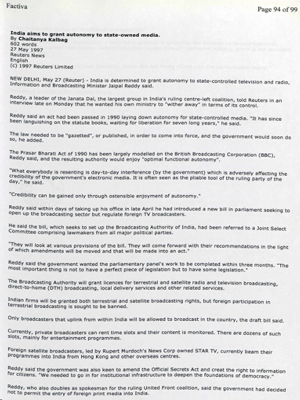India aims to grant autonomy to state-owned media
[Reuters]
Published date: 15th Jun 1997
27 May 1997
Reuters News
English
(c) 1997 Reuters Limited
NEW DELHI, May 27 (Reuter) – India is determined to grant autonomy to state-controlled television and radio, Information and Broadcasting Minister Jaipal Reddy said.
Reddy, a leader of the Janata Dal, the largest group in India’s ruling centre-left coalition, told Reuters in an interview late on Monday that he wanted his own ministry to “wither away” in terms of its control.
Reddy said an act had been passed in 1990 laying down autonomy for state-controlled media. “It has since been languishing on the statute books, waiting for liberation for seven long years,” he said.
The law needed to be “gazetted”, or published, in order to come into force, and the government would soon do so, he added.
The Prasar Bharati Act of 1990 has been largely modelled on the British Broadcasting Corporation (BBC), Reddy said, and the resulting authority would enjoy “optimal functional autonomy”.
“What everybody is resenting is day-to-day interference (by the government) which is adversely affecting the credibility of the government’s electronic media. It is often seen as the pliable tool of the ruling party of the day,” he said.
“Credibility can be gained only through ostensible enjoyment of autonomy.”
Reddy said within days of taking up his office in late April he had introduced a new bill in parliament seeking to open up the broadcasting sector but regulate foreign TV broadcasters.
He said the bill, which seeks to set up the Broadcasting Authority of India, had been referred to a Joint Select Committee comprising lawmakers from all major political parties.
“They will look at various provisions of the bill. They will come forward with their recommendations in the light of which amendments will be moved and that will be made Into an act.”
Reddy said the government wanted the parliamentary panel’s work to be completed within three months. “The most important thing is not to have a perfect piece of legislation but to have some legislation.”
The Broadcasting Authority will grant licences for terrestrial and satellite radio and television broadcasting, direct-to-home (DTH) broadcasting, local delivery services and other related services.
Indian firms will be granted both terrestrial and satellite broadcasting rights, but foreign participation in terrestrial broadcasting is sought to be banned.
Only broadcasters that uplink from within India will be allowed to broadcast in the country, the draft bill said.
Currently, private broadcasters can rent time slots and their content is monitored. There are dozens of such slots, mainly for entertainment programmes.
Foreign satellite broadcasters, led by Rupert Murdoch’s News Corp owned STAR TV, currently beam their programmes into India from Hong Kong and other overseas centres.
Reddy said the government was also keen to amend the Official Secrets Act and creat the right to information for citizens. “We needed to go in for institutional infrastructure to deepen the foundations of democracy.”
Reddy, who also doubles as spokesman for the ruling United Front coalition, said the government had decided not to permit the entry of foreign print media into India.
He said there was a feeling that the impact of foreign print media was much greater than that of electronic media.
“I am not saying that is an incontestable proposition.”
“All serious people read newspapers. I don’t think anybody is guided by the analysis on foreign television. Secondly, you cannot stop foreign satellite television except through repressive policing, which is not desirable in a democracy.”
“We are not inviting international electronic media. We are trying to live with the technological reality.”
(c) Reuters Limited 1997






